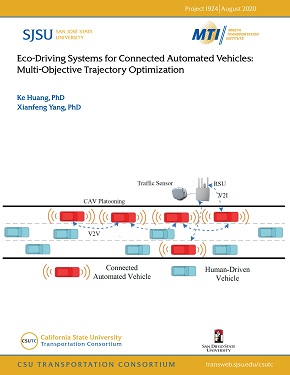- 408-924-7560
- mineta-institute@sjsu.edu
- Donate
Eco-Driving Systems for Connected Automated Vehicles: Multi-Objective Trajectory Optimization
This study aims to leverage advances in connected automated vehicle (CAV) technology to design an eco-driving and platooning system that can improve the fuel and operational efficiency of vehicles during freeway driving. Following a two-stage control logic, the proposed algorithm optimizes CAVs’ trajectories with three objectives: travel time minimization, fuel consumption minimization, and traffic safety improvement. The first stage, designed for CAV trajectory planning, is carried out with two optimization models. The second stage, for real-time control purposes, is developed to ensure the operational safety of CAVs. Based on extensive numerical simulations, the results have confirmed the effectiveness of the proposed framework both in mitigating freeway congestion and in reducing vehicles’ fuel consumption.
KE HUANG
Dr. Huang received the BS, MS, and PhD degrees in Electrical Engineering from the Université Grenoble Alpes, Grenoble, France, in 2006, 2008, and 2011, respectively. He was a Postdoctoral Research Associate at the University of Texas at Dallas, Richardson, TX, USA, from 2012 to 2014. In 2014, he joined the Department of Electrical and Computer Engineering at San Diego State University, San Diego, CA, USA, where he is now an Associate Professor. His research focuses on intelligent vehicles, very-large-scale integration (VLSI) testing and security, and computer-aided design of integrated circuits (ICs).
He has published over 30 journal and conference papers and served as a Program Committee Member in various IEEE conferences, as well as a Guest Editor of Springer Journal of Electronic Testing Theory and Applications (JETTA). He was awarded a PhD Fellowship from the French Ministry of National Education from 2008 to 2011. He was a recipient of the Best Paper Award from the 2015 IEEE VLSI Test Symposium (VTS’15), and he also received the Best Paper Award from the 2013 Design Automation and Test in Europe (DATE’13) conference.
XIANFENG TERRY YANG
Dr. Yang received the BS degree in civil engineering from Tsinghua University, Beijing, China in 2009; he received the MS and PhD degrees in civil engineering from the University of Maryland (College Park) in 2012 and 2015, respectively.
Dr. Yang is currently an Assistant Professor in the Department of Civil & Environmental Engineering at the University of Utah. Before joining the University of Utah, he had been working as an Assistant Professor at San Diego State University. His current research areas include machine learning application in transportation, evacuation planning and operation, traffic operations with connected automated vehicles, intelligent transportation systems, traffic safety, and network flow modeling.
-
Contact Us
San José State University One Washington Square, San Jose, CA 95192 Phone: 408-924-7560 Email: mineta-institute@sjsu.edu






